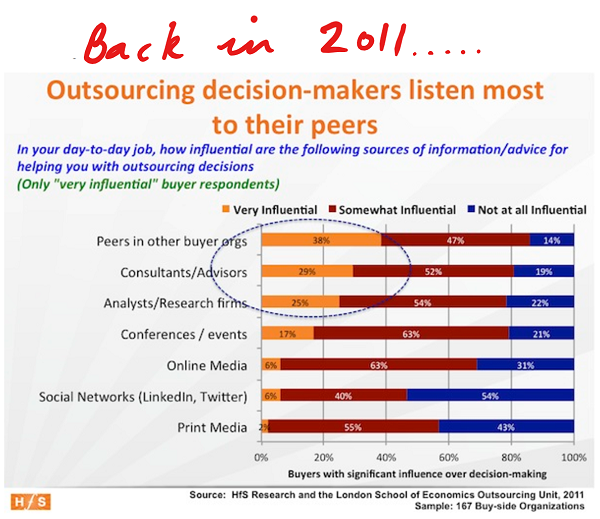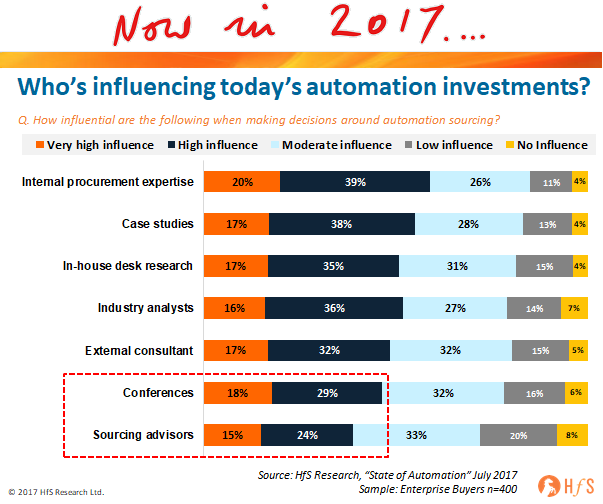Remember when sourcing advisors has become the “new analysts” and dominated so many outsourcing discussions? Remember when it was the norm for clients to bring in the sourcing specialists whenever they needed a deal done, not only to get a good price, but also to make sure they selected the right partner and had a strategic view of the future? Remember when most advisors were not only contract experts, they were also strategists, researchers, sounding boards and respected brands you could hang your hat on… Just look at our 2011 study when advisors lorded the influence over everyone bar direct peer feedback:

Fast forward to today, with all the sourcing advisors doubling-down in RPA to compensate for the drying up outsourcing deals and confidently hoping their outsourcing clients will immediately turn to them to help them grapple with the new outsourcing-cum-automation model. Surely their ability to craft deals for clients will put them in pole position to take their clients down the RPA path…
Let’s visit our brand new (still-in-the-field) study on the 2017 State of Automation, and it’s telling us a very different story when we spoke with 56 enterprises actually deploying RPA:

Less than half the RPA buyers view either consultants of sourcing advisors as influential in their automation sourcing. Even conferences are impacting automation buyers more.
So what’s gone so wrong with advisors in automation?
Credibility. Suddenly many advisors who were previously hawking their deep understanding of HCL versus TCS’s FTE rate cards are now suddenly adding their names to white papers on automation and trying to insert themselves into serious client conversations about said topic. It’s just not credible.
Smarter clients. The swirl of information over social channels is so intense these days that most clients’ knowledge isn’t that far behind the experts. In many cases, you’ll learn more about RPA talking with a client in beta mode than an advisor or analyst trying to impress you at a conference. That is why internal channels, such as procurement and plain old desk research is such an influence factor these days.
Archaic focus on headcount reduction. Just because you could create simple cases for headcount reduction with “take the people” outsourcing, doesn’t mean you can deploy the same draconian strategy to automation. Even the most clueless governance executive knows you can just fire people before you programmed some manual activities into a piece of software. Sure, there are serious productivity gain to be gleaned over time through the digitization of manual processes, but to tie this to immediate headcount takeout just doesn’t work.
Competition from service providers. For the first time, sourcing advisors and service providers are going head to head, and automation is the promoter of the fight. When clients want to understand RPA and a partner so help them roll it out, they need people who are in the game for the long haul, not a broker to dip in and out and get a deal done. Many of the sourcing advisors are just not transformation people – they are great at helping clients plan their outsourcing weddings, but marriage guidance councilors they truly are not. Service providers depend on long-term, complex and often messy relationships to keep them employed and busy… and RPA really fits the bill. While it poses significant threats to their margins over the long term, they cannot afford to be not playing in the automation game. What’s more, most the BPO service providers are rapidly running RPA in their own delivery organizations, which is giving them the experience and lower cost base to be effective.
The traditional consulting model doesn’t work with RPA. The advisors are struggling to scale up talent bases that can understand the technology and deal with the considerable change management tensions within their clients. RPA is murky and complex, and not something you can train bus loads of 28-year-old MBAs to master overnight. Meanwhile, we are seeing some advisors simply do some brokering of RPA software deals for small fees, only to make a hasty exit from the client as they do not have the expertise to roll-out effective implementation and change management programs.
RPA specialist consultants few and far between. Pure-play RPA advisors are explaining this is not quite so easy and requires a lot more of a centralized, concise strategy. There are simply not enough of these firms in the market, especially with Genfour having been snapped up recently by Accenture. With only a small handful of boutique specialists to go around, these firms can pick and choose their clients and command high rates. Quality RPA advisory boutiques, such as Symphony Ventures, are literally turning business away as they cannot scale fast enough to cope with the demand.
Advisors are not producing research. There’s a reason why procurement folks, analysts and simple desk work actually sit above advisors in the new data – clients want product specific benchmarks and real experienced advice that they are simply not getting from the advisors. All the advisors are putting out is the same of tired “drama” about robots replacing workers, and how to think “strategically” about RPA. While I like some of the stuff I see coming out of the likes of McKinsey, KPMG and EY, it’s just not giving me the real deal about which RPA vendor I need to be working with, how these tools truly stack up against each other and how I can actually build a bloody bot. That is why many clients are getting more reality from attending a conference than the lovely lunch they just got bought from their nice friendly consulting partner.
Turgid, hackneyed marketing doesn’t work anymore. Cheesy pictures of robots and the same endless stream of 300-foot view puff that sounds just like the last piece you read on LinkedIn by some weird dude who you can’t actually recall allowing into your network, isn’t helping matters. These advisors are relying on their brand and past reputation for credibility in a world where clients want to see some meat on the bones.
The Bottom-line: Advisors need a vastly different approach to automation to avoid complete irrelevance in this market
This industry has literally entered into a destructive war over automation, and the need for credible, independent and experienced advice has never been so in demand from customers. The skills to make automation a feasible profitable reality are few and far between, while greedy corporate leaders demand cost savings that simply are not achievable if their organizations fail to make the necessary investments and partnerships. Did companies become world class at HR overnight because they bought an expensive Workday subscription? Or stellar at sales and marketing because they slammed in a Salesforce suite? So why should they become amazing at cost-driven automation simply because they went and bought some licenses from an RPA vendor promising bot farms and virtual labor forces?
RPA and Intelligent Automation have sparked a major war in the worlds of outsourcing and operations, where many battles are being fought – and the winners will be those who are in this for the long haul, who can absorb some short-term pain in order to benefit from the larger spoils further down the road. While automation is killing outsourcing today – costing many people their jobs, their reputations and destroying the profitability of legacy engagements, those who can hunker down, focus on self-contained projects where they can fix one broken process at a time, can get stakeholders onside by demonstrating meaningful, impactful outcomes without major resource investments, will be the winners.
Advisors who can win out are those who can take their clients through this journey – one process chain at a time, evaluating all the right solutions and developing milestones that are realistic. Sadly the easy gigs where you could roll out of bed for a couple of million in billings are now extinct. The key is to play the long game, invest in the new skills you need to be truly credible in this market, and produce credible research that gets down and dirty in the weeds, not that 300 ft helicopter view that everyone’s heard over and over again…
Posted in : Outsourcing Advisors, Robotic Process Automation







Spon on piece, Phil. You should also write a piece on their understanding of moving apps to the cloud and also the whole digital transformations landscape. They are clueless there as well
Phil – a timely piece with timely data. The sourcing advisors are desperate and are going at the automation space with very little expertise. Today’s clients are wising up to it.
Phil. A well written and important article. The fear of missing out on this extraordinary opportunity is driving many organizations, that to date have held trusted relationships with their clients, to start doing technical development and transformation work that is way outside their capabilities. As always a little knowledge is a dangerous thing and we have observed and had to fix some absolutely appalling work implemented by these newly self anointed experts. What keeps me awake at night is not whether I can recruit enough people worthy of working at Symphony but rather what the impact on the market will be when one of the major consulting firms, BPO firms or former sourcing advisers hits the news when one of the robots they have built causes a major financial issue. Change and transformation hasn’t suddenly become easy with these new tools. Although they provide an amazing opportunity, design, implementation discipline and thorough testing are more important than ever.
It’s like there’s a ferocious / desperate trend to be at the formal party, but they are all turning up in fancy dress!
I get agitated at the mis-information.
This post clearly explains why so many of my friends and colleagues have left consulting and gone to work for suppliers. Agree completely with the one broken process at-a-time approach, whether it be in IT, Finance, HR or elsewhere in the business. Those that can guide clients through the what/when decisions will do well.
Just to pile on – at my firm (Neo Group), we have talent, automation, data and analytics built into our assessment process, so our clients get a comprehensive perspective on their options before making any sourcing decisions.
@Al – always good to hear a blatant sales pitch. Now I have published it, perhaps you can explain how, exactly, you incorporate automation into your ‘assessment process’? Do you have specific research to share? Do you help clients understand and implement bots?
PF